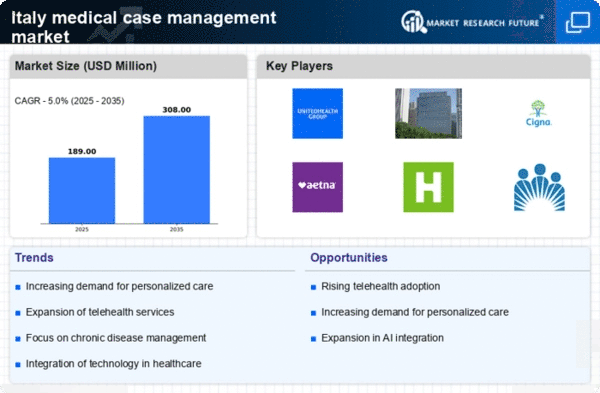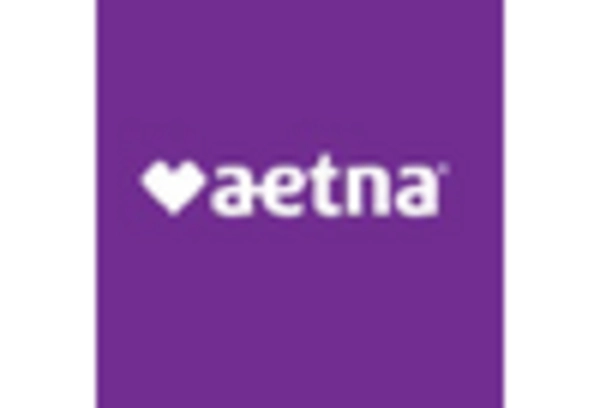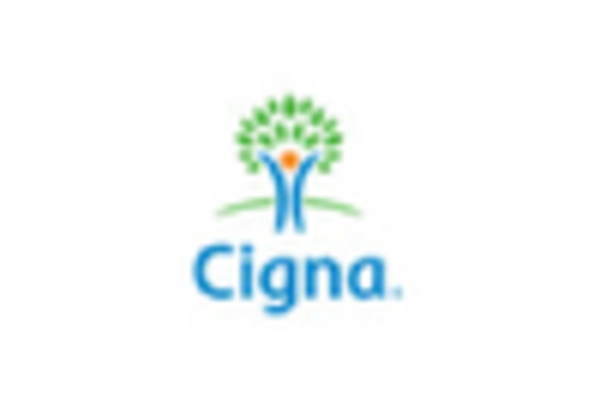Policy Reforms
Recent policy reforms in Italy are influencing the medical case-management market by promoting integrated care models. The Italian government has initiated several reforms aimed at improving healthcare delivery and patient outcomes, which include the establishment of multidisciplinary teams for case management. These reforms are designed to streamline processes and enhance collaboration among healthcare providers, thereby improving the overall efficiency of care. As a result, the medical case-management market is likely to benefit from increased investment in case management programs and training for healthcare professionals. Furthermore, the emphasis on preventive care and early intervention aligns with the objectives of case management, suggesting a favorable environment for market growth. The ongoing policy changes are expected to create new opportunities for stakeholders within the medical case-management market.
Aging Population
Italy's demographic landscape is characterized by a rapidly aging population, which significantly impacts the medical case-management market. With over 23% of the population aged 65 and older, the demand for tailored healthcare services is increasing. This demographic shift necessitates comprehensive case management solutions to address the complex health needs of older adults. is expected to expand as healthcare providers prioritize chronic disease management, rehabilitation, and long-term care coordination for this demographic.. Additionally, the Italian government has recognized the importance of geriatric care, leading to increased funding and resources allocated to case management initiatives. As a result, the medical case-management market is expected to expand to meet the evolving needs of an aging society.
Rising Healthcare Costs
is seeing a significant rise in demand. As expenditures on healthcare services continue to escalate, stakeholders are seeking efficient solutions to manage these costs. The Italian healthcare system has reported an annual growth rate of approximately 4.5% in healthcare spending, prompting healthcare providers to adopt case management strategies that optimize resource allocation. This trend is likely to drive the medical case-management market as organizations aim to enhance patient outcomes while controlling expenses. Furthermore, the emphasis on value-based care is pushing providers to implement case management practices that ensure patients receive appropriate care without unnecessary financial burdens. Consequently, the medical case-management market is positioned to expand as healthcare entities strive to balance quality care with cost efficiency.
Technological Advancements
Technological advancements are playing a pivotal role in shaping the medical case-management market in Italy. The integration of digital health tools, such as telemedicine and electronic health records, is enhancing the efficiency and effectiveness of case management practices. According to recent data, approximately 60% of healthcare providers in Italy have adopted some form of digital technology in their operations. This trend is likely to continue, as technology facilitates better communication among healthcare teams and improves patient engagement. Moreover, the use of data analytics in case management allows for more personalized care plans, ultimately leading to improved patient outcomes. As these technologies become more prevalent, the medical case-management market is expected to witness substantial growth, driven by the demand for innovative solutions that enhance care delivery.
Increased Focus on Chronic Disease Management
The medical case-management market in Italy is witnessing a heightened focus on chronic disease management, driven by the rising prevalence of chronic conditions such as diabetes and cardiovascular diseases. Approximately 30% of the Italian population is affected by at least one chronic illness, necessitating effective case management strategies to improve health outcomes. Healthcare providers are increasingly recognizing the importance of coordinated care for patients with chronic diseases, leading to the development of specialized case management programs. This trend is likely to propel the medical case-management market as organizations seek to implement comprehensive care plans that address the unique needs of these patients. Additionally, the integration of technology in chronic disease management is enhancing the ability to monitor patient progress and adjust care plans accordingly, further supporting market growth.

















